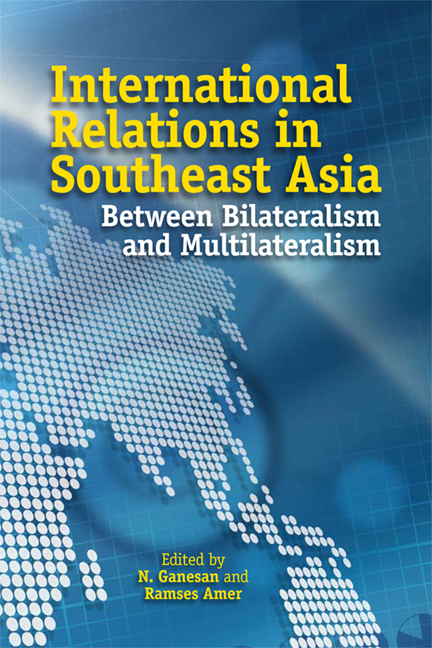Book contents
- Frontmatter
- Contents
- Preface
- List of Abbreviations
- Contributors
- Introduction
- Part I On International Relations
- Part II Case Studies — Mainland Southeast Asia
- Part III Case Studies — Maritime Southeast Asia
- 7 Malaysia-Indonesia Bilateral Relations: Sibling Rivals in a Fraught Family
- 8 Indonesia-Singapore Relations
- 9 Bilateralism and Multilateralism in Malaysia-Philippines Relations
- 10 Malaysia-Singapore Relations: A Bilateral Relationship Defying ASEAN-style Multilateralist Approaches to Conflict Resolution
- 11 Bilateral Relations between Indonesia and the Philippines: Stable and Fully Cooperative
- Conclusion
- Index
10 - Malaysia-Singapore Relations: A Bilateral Relationship Defying ASEAN-style Multilateralist Approaches to Conflict Resolution
from Part III - Case Studies — Maritime Southeast Asia
Published online by Cambridge University Press: 18 November 2017
- Frontmatter
- Contents
- Preface
- List of Abbreviations
- Contributors
- Introduction
- Part I On International Relations
- Part II Case Studies — Mainland Southeast Asia
- Part III Case Studies — Maritime Southeast Asia
- 7 Malaysia-Indonesia Bilateral Relations: Sibling Rivals in a Fraught Family
- 8 Indonesia-Singapore Relations
- 9 Bilateralism and Multilateralism in Malaysia-Philippines Relations
- 10 Malaysia-Singapore Relations: A Bilateral Relationship Defying ASEAN-style Multilateralist Approaches to Conflict Resolution
- 11 Bilateral Relations between Indonesia and the Philippines: Stable and Fully Cooperative
- Conclusion
- Index
Summary
Introduction: The Persistent Influence of Realism
In an anarchic world such as ours — comprised as it is of about 195 state-units whose interactions are still governed by Westphalian notions of sovereignty — the primary goal of foreign policy is to ensure state survival. Once the state develops confidence in managing national security, and by extension, defending itself against external threats, its leadership invests a higher degree of trust in international cooperation, including strengthening ties with neighbours with whom it has outstanding historical, territorial, political, ideological, economic, and resource disputes. As such, this chapter takes the view that the key issues in Malaysia-Singapore relations are better analyzed and evaluated within the framework of political realism. The American political scientist, Sheldon Simon, has made very pertinent observation in this regard on Southeast Asian international relations:
Realism (or self-help) will continue as an important analytical framework for understanding Southeast Asian security because individual states still have unresolved conflicts with each other and because no consensus exists whether external threats to regional order exist or who they may be.
Foreign policies pursued essentially within a state-centric framework tend to endorse the realist paradigm, while efforts to build regional political, economic, and security institutions for mutual gain, although at an incipient stage, suggest also that neo-liberalist tendencies coexist with the realist approach to national security and regional advancement. This coexistence of apparently divergent political perspectives — the former stressing politics as a zero-sum game and the latter focussing more on state capabilities and potential to achieve security and prosperity through cooperation rather than conflict — tends to better explain the dynamics of Malaysia-Singapore relations. The foreign policy interests, strategies, and expected outcomes of these two Causeway neighbours, and especially for the island republic since independence in 1965, reflect an appreciation based on power considerations as in this anarchic world the best and historically proven approach has been self-help.
- Type
- Chapter
- Information
- International Relations in Southeast AsiaBetween Bilateralism and Multilateralism, pp. 254 - 286Publisher: ISEAS–Yusof Ishak InstitutePrint publication year: 2010



